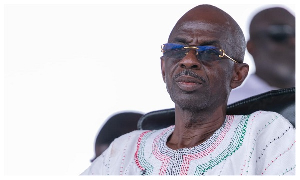Over the years, Ghana has signed many treaties in many areas including; governance, bilateral, environment, security, labour, economics and technology with countries, international bodies and continental unions.
Synopsis
One of these is the African Charter on Democracy, Elections and Governance (ACDEG) as one of the many such agreements.
Developed in 2007, a key roadmap of this charter is to encourage better governance across the African continent.
It also spells out the norms, values and standards agreed by the African States, including; the universal values of democracy and respect for human rights; rule of law premised on the supremacy of the constitution and the holding of democratic and credible elections.
Others are the prohibition and rejection of unconstitutional changes of government; promotion and protection of the independence of the judiciary; sustainable development and human security; fostering citizen participation and the transparency and accountability in the management of public affairs.
The ACDEG, which is often referred to as a Democratic Charter, draws inspiration from several AU declarations, charters and instruments including; the AU Constitutive Act, which asserts the eminence of democratic governance and provides for the imposition of sanctions in case of unconstitutional change of governments.
It came to force on February 15, 2012, through which State parties were obliged to comply with the charter obligations, which included; reporting on the legislative, or other relevant measures to give effect to the principles and commitment of the charter.
In all, the democratic charter contains eleven chapters and its main objectives are to reinforce AU Member States’ commitment to democracy, the rule of law, human rights, peace and socio-economic development.
The provisions in the charter establish minimum standards for ensuring, promoting and protecting democratic governance principles and practices.
Countries that ratify the charter agree automatically to have representative systems of government with separation of powers between branches, promote democracy, rule of law and basic human rights.
They will additionally ensure democratic rule and constitutional changes of power through free, fair and transparent elections, respect ethnic, cultural and religious diversity.
Ghana’s journey in ACDEG
After Ghana joined other countries to adopt the charter by the 16th Ordinary Session of the Assembly of the AU in January 2011, the PRC forwarded it to the AU liaison desk at the Ministry of Foreign Affairs.
It was then forwarded to the Attorney General’s Department (AG) to study and analyse the implications on the local constitution. They examined and aligned the ACDEG instruments, which was in line with Ghana’s 1992 Constitution.
The charter was then ratified and deposited at the AU Legal Council. Ghana did not have to go through the implementation process, which required setting up, and strengthening governance institutions such as the Electoral Commission and National Commission for Civic Education as well as adherence to separation of powers and good governance.
Ghana’s journey is now at the reporting stage, where she is required to report on the instruments including; free and fair elections, independence of the judiciary, political pluralism and tolerance, sustainable development and human security.
Others are the establishment of the necessary conditions to foster citizen’s participation, transparency, access to information, freedom of the press and accountability in the management of public affairs, promoting gender balance and equality in the governance and development processes.
Mrs Rizzan Nassuna, a Democracy Assessment and Governance Expert at the African Governance Architecture Secretariat Department of Political Affairs of the AU, speaking in an interview with the Ghana News Agency, said the only step left for Ghana is to report on the ACDEG instruments.
Ghana stands tall and is an example worth emulating by other countries because it has thriving democratic governance principles in practice through the peaceful transfer of power.
“Regarding ACDEG, there are so many instruments being adhered to that I can relate with. It is unfortunate that we have not seen a report from Ghana on how they were implementing the ACDEG. I know when supported with the right tools they could report,” she added.
Mrs Nassuna disclosed that plans were advanced to provide the necessary knowledge and skills to the Ghanaian team to be able to report empirically to back ‘what is seen and heard’.
Mrs Margaret Brew-Ward, the Women’s Rights and Campaigns Manager at ActionAid, recounts that the world has watched with amusement since 1992 when Ghana began her democratic journey, a key proponent of ACDEG.
Transition since 1992
“There has been a smooth exchange of power since the time of former Presidents Jerry John Rawlings, John A. Kufuor, John Evans Mills, John Dramani Mahama to the current President Nana Akufo-Addo,” she stated.
Internationally, she notes that her exploits in governance and rule of law have earned an accolade, as being a model of enduring viability of democracy in Africa.
Mrs Brew-Ward observes that at the local level, elections have gained roots as it is done under a free and fair environment.
“Currently, the government has initiated steps to elect the Municipal, Metropolitan and District Chief Executives as part of steps to enhance local level participation in governance and reduce the “winner takes all syndrome” as well as deepen the nations democratic credentials”.
The country is doing creditably well in following through to the tenants of ACDEG, hence the urgent need for it to take steps to meet its reporting obligations under the charter.
Opinions of Friday, 16 August 2019
Columnist: ghananewsagency.org
The African charter on democracy, elections and governance, Ghana’s journey
Entertainment














